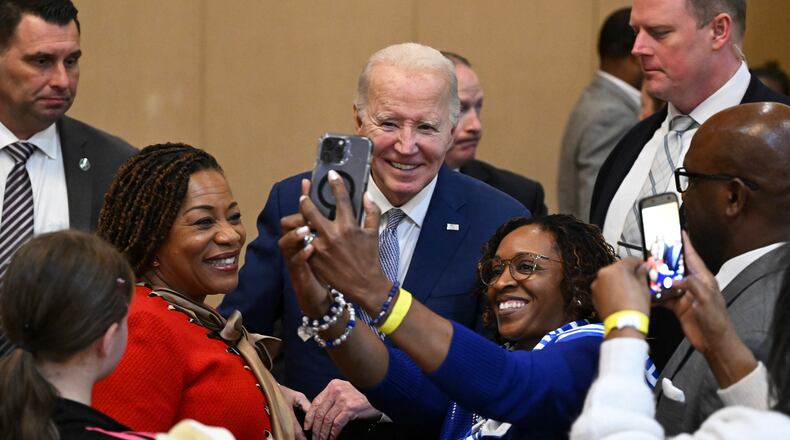Saturday’s Democratic primary in South Carolina provides the first test of President Joe Biden’s support from Southern Black voters in the 2024 election. It’s the first state on either party’s primary calendar with a large number of Black and other nonwhite voters.
In the 2020 election, voters in the state helped solidify him as a nominee for the Democratic Party. Now, he hopes to maintain their support and use it to ramp up his campaign to Black voters across the South.
“I don’t think you would have a President Biden if it were not for Georgia and South Carolina,” said U.S. Rep. Nikema Williams, chair of the Democratic Party of Georgia. “The attention that’s being paid to South Carolina right now in the lead-up to their primary this Saturday can not be overstated. It shows that President Biden is investing in the South.”
Although Biden is unlikely to win South Carolina in a general election, a show of support from his party could demonstrate his ability to turn out voters even in states where he is not favored.
“There are some ways in which South Carolina Black voters mirror what is happening with the Black population more broadly — not exactly, but broadly,” said Todd Shaw, an associate professor of political science and African American studies at the University of South Carolina. He said a lack of support for Biden could indicate future difficulty mobilizing Black voters elsewhere.
For the past two decades, nonwhite voters have consistently turned out for Democratic primaries in South Carolina and Georgia. In 2020, one out of every two voters in South Carolina’s Democratic primary was Black or nonwhite.
Georgia provides more detailed voter participation data than a simple breakdown between white and nonwhite voters as in South Carolina.
In 2020, Black voters alone cast more than half the ballots in Georgia’s Democratic primary delayed by COVID-19. In all, nonwhite voters cast seven out of every 10 ballots in that election.
Black voters in the South are a critical demographic for Biden. They make up the majority of the Democratic parties in Georgia and South Carolina, according to the Pew Research Center.
Over 90% of voters in Clayton County are nonwhite, tops in that category in Georgia. In South Carolina, Allendale County leads with over 75% of its voters being nonwhite.
Over the past two elections, Black voters contributed to almost one-third of the growth of registered voters in Georgia. Fulton County has the most nonwhite registered voters, totaling over half a million.
South Carolina offers Biden a chance to learn more about these voters’ needs and tailor his messaging for other states. Biden’s message has not reached all of Georgia yet. While some Black voters are happy to be sought after by the campaign, others are skeptical.
“They simply want our vote. They are only concerned with us on voting day,” said John Hightower, a 61-year-old resident of Wrightsville, a town of about 3,500 in Middle Georgia.
In Georgia, 1 in 5 Black registered voters support Donald Trump in the general election, according to the Atlanta Journal-Constitution’s most recent poll. An additional 18% of Black voters said they still didn’t know who they would vote for in November or even whether they would vote at all. In 2020, almost 90% of Black voters in Georgia voted for Biden, according to a CNN exit poll.
“The expectation on the part of Republicans is not that they’re going to get the bulk of the Black vote, but that they can shave off a large enough share,” said Charles Bullock, a political science professor at the University of Georgia. He predicted that more Black voters in Georgia will support Biden as the election approaches.
In the 2020 election, about 20% of all registered Black voters did not turn out, according to an AJC analysis of Georgia secretary of state voter data. In comparison, nearly 12% of all registered Hispanic voters did not cast a ballot. White voters had the highest turnout, with about 14% not going to the polls.
Kendra Cotton works to increase civic engagement from Black voters and other marginalized communities as CEO of the New Georgia Project Action Fund. She strives to encourage more people to vote and to teach them about other civic activities, such as calling local officials.
For Cotton, the number of people who did not vote is energizing, not discouraging. “It challenges me,” she said. “We have a lot of opportunity there. We have room for growth.”
About the Author
Keep Reading
The Latest
Featured




